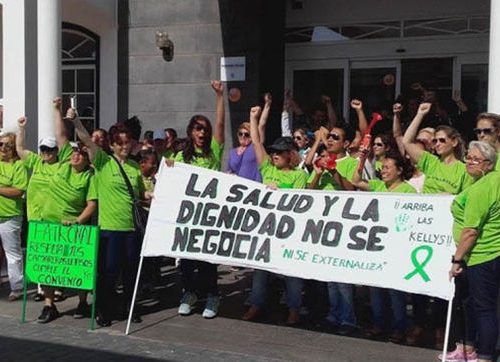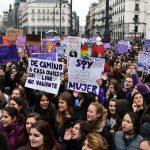IN THE FACE OF THE PANDEMIC, THE PROGRESSIVE GOVERNMENT DEEPENS THE MEASURES TO SUPPORT THE POPULATION – The pandemic has exposed the whole crisis of capitalism. Adjustment policies with the privatization of public services have resulted in an attack on the masses and a weakening and loss of state sovereignty. The European Union has devastated southern Europe with its austerity policies, today we are suffering the consequences.
(Note: On 8.1.2020, the interim government in Spain was sworn-in. It is a left-wing coalition between the Socialist Party (PSOE) and Unidas Podemos, headed respectively by Pedro Sanchez and Pablo Iglesias).
This government inherited health services greatly deteriorated, and it has lacked the minimum resources to deal with them. The cuts in health over the last 20 years, including under the socialist governments, deepened greatly under the PP governments and in Catalonia under the leadership of the Catalan nationalist right. The shortage of staff, the lack of necessary and safe equipment to fight the virus, caused a collapse of public health which contributed to much death and contagion, among the health personnel included.
The privatizations, which have spread across Europe, have resulted in a drain on public health and a transfer of services to large health consortia owned by hedge funds and multinationals. The same situation occurred in the retirement homes, mostly private and outside state control, to the great detriment of the families. The profitability criterion prevailed. The high number of deaths is another example of the criminality of this system. In many cases, families were not even able to say goodbye to their loved ones.
The response of the people, the workers’ movement in particular, was very quick and decisive. SEAT workers stopped production and forced the company to close but maintained a line of production to produce respirators for hospitals. Small textile workshops have made masks and protective elements. An immigrant cooperative joined this activity.
Added to this is the government’s late reaction to take the necessary security measures: borders’ closure, generalized tests, generalized confinement which should have been immediate given the serious situation that Italy was already experiencing. Pressure from economic power groups, from big business, is behind the government’s weak attitude.
 People help and entertain each other during the lockdown.
People help and entertain each other during the lockdown.
The sanitary equipment was hastily bought, especially from Chinese companies, without control, which led to the purchase of poor-quality products that did not meet the necessary standards. The Sánchez government, following strong pressure from Podemos, finally approved the “Social Shield against the Coronavirus” and adopted the following social measures:
-
All evictions without alternative accommodation are suspended, rental contracts are extended by 6 months
-
Extension of the moratorium on mortgages
-
Power cuts in the homes of individuals are prohibited for the duration of the state of emergency
-
Subsidy for domestic workers who lose their jobs or whose working hours are reduced
-
Emergency unemployment benefits for temporary workers
-
An alternative of safe housing is guaranteed for victims of domestic violence.
Over 40,000 companies have introduced temporary unemployment. This allows them to suspend employment contracts, or to temporarily reduce the working hours. 70% of the salary is paid by the state. Layoffs due to illness, imposed by the Labour Reform made by the Popular Party, were abolished – but the Reform as such was not removed by the government in spite of this promised having figured in the electoral platform of the PSOE-Podemos coalition. Finally, a minimum living income has been approved; it is a very important social breakthrough announced by Pablo Iglesias, as Vice President of Social Affairs. This measure tries to reduce the acute inequalities that afflict the most vulnerable groups, including regular immigrants (those who are not regularized are excluded). 2.3 million people will benefit, especially in households with children. You should know that Spain is the third country in Europe in terms of child poverty. The government reacted with some sensitivity to the acute social crisis. But it is not enough. Pressure from the European Union and NATO – rejecting the use of Cuban doctors to intervene in Spain – is one example.
The right-wing conducts a very hard opposition which tries to exhaust the government and provoke new elections, if possible. In Madrid that is ruled by the PP (right-wing), the situation has been the vilest and the most contemptuous towards the life and conditions of the people. Seniors in residences were denied hospital care to give priority to the youngest because the intensive care units (ICUs) had no beds available. Public sector school children were deprived of school-meals replaced by the worst quality pizzas and fast foods.
Large companies like NISSAN have already announced the closure of the three Spanish factories by the end of the year. The workers’ response was immediate: mobilizations, assemblies, unlimited strikes and great solidarity from the whole of the left. ALCOA, an aluminium factory in Lugo (Galicia), divests half of the workforce and threatens the company with total closure, while 20,000 direct and indirect jobs depend upon it.
Most of the trade unions support the workers’ struggles, but they do not offer alternatives. The more radical left proposes nationalizations. Podemos does so too, but timidly. The government is considering it. The trade union left and the social movements propose a much deeper social plan, such as the requisition of all health resources, a moratorium on the payment of rents and mortgages, 100% salary coverage and economic healthcare coverage.
Demonstrations have already been announced for the various demands behind the slogan “Let the crisis be paid for by the banks and the IBEX 35” (large companies). Demands include the repartition of work and wealth, the repeal of the Labour Reforms, the retaking under public control of all the public services that have been privatized, guarantees for decent housing, the immediate regularization of all migrants. These are very good proposals but they are put forward in the form of a confrontation against the left coalition government.
At the same time, the situation in Podemos is not favourable: there are many internal struggles and a consolidation of an apparatus which prevents open debate.
A united front and the discussion of a global program for social transformations are the fundamental tasks of the next stage.
Translation of the blog:
Posadistas Hoy –
June 15, 2020

















